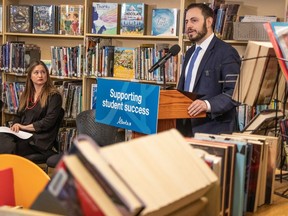This is the UCP’s second crack at replacing the social studies curriculum and the province’s third in six years

After months of engagement and years of battle surrounding what Alberta students should learn in social studies class, the province’s new draft curriculum for the subject is ready to be piloted in kindergarten to Grade 6 classrooms next school year.
Education Minister Demetrios Nicolaides Schools announced Friday that schools will be given the opportunity to test the new social studies guidelines in a pilot program starting this fall. The new curriculum is slated to replace the two-decade-old one that is currently taught in classrooms.
“I am incredibly proud of the work that’s gone into developing this new K-6 social studies curriculum, and I am excited to see how it transfers into the classroom through piloting this fall,” said Nicolaides in a news release. “I look forward to further collaboration with school leaders and teachers as we continue our work to build a comprehensive curriculum that builds students’ critical thinking, problem-solving and decision-making skills, and empowers them to be active citizens.”
Nicolaides says, based on feedback from Albertans after the draft curriculum was unveiled last month, they’ve shifted some content around — such as moving the topic of taxes from Grade 2 to Grade 5 — and the content load has been reduced for Grade 4.
“Furthermore, additional First Nation, Métis, Inuit and Francophone content and perspectives have been included. In addition, content around racism, anti-racism, anti-Semitism and Islamophobia have also been added,” he said.
This is the UCP’s second crack at replacing the social studies curriculum and the province’s third in six years. New curriculums proposed by the NDP in 2018 and the UCP in 2021 were both criticized and rejected.
The new draft is based on engagement with parents, teachers, education partners and curriculum specialists that started in August last year; nearly 15,000 Albertans provided feedback. The province says it focuses on building critical thinking skills and empowering students to be engaged citizens.
“As researchers and educators, we have provided critical feedback and constructive advice that could inform the creation of a high-quality social studies program for Alberta students,” reads the March 15 letter. “However, our strategic advice and alternative directions have been largely ignored to the detriment of future generations. Alberta students deserve better.”
The group raised concerns similar to those raised about the 2021 draft curriculum, noting a lack of opportunities for critical thinking and limited perspectives from diverse cultures, including First Nations and Metis. It also noted a lack of a coherent through-line in the curriculum, calling it a “random sequence of learning moments.”
Nicolaides said he thinks tweaks made after the latest engagement “moves the needle” on the group’s concerns, but said many of their concerns were related to older grades for which a new curriculum has not yet been established.
“I’m sure we’ll be able to address that when we get to developing those grades,” he said. “But they did specifically have some concern around learning outcomes and that we can do more to strengthen learning outcomes that foster critical thinking skills … We have absolutely taken that to heart and there are now significantly less outcomes associated with lower-level thinking than the March version.”
The Alberta Teachers’ Association, too, criticized the new draft, calling for further teacher engagement. The province said it engaged nearly 900 educators and education partners between last August and the beginning of this month.
“The current draft is an improvement over the disastrous 2021 version; however, further improvement is required. The feedback of active teachers must be reflected before the next draft hits the classroom,” said Nancy Luyckfassel, the ATA’s curriculum lead, in a March news release.

Feedback from the classrooms participating in the pilot will be used to finalize the K-6 social studies curriculum before it becomes mandatory for the 2025/26 school year. However, the minister said he doesn’t expect major changes to be made, noting the significant engagement that’s gone into creating the curriculum to this point.
“I think we’ve gotten the balance right,” he said. “The door’s still open to minor modifications, additions, deletions. I’d be absolutely happy to incorporate those.”
The province has earmarked $34 million to support classrooms piloting curriculums next school year. Teachers will get release days to support planning and will be provided learning and teaching resources, as well as professional learning opportunities.
School authorities are asked to contact Alberta Education by May 15 if they’d like to participate.
The province has also updated the ministerial order on student learning — the document that outlines the vision, values and learning foundations for students in K-12 education — and a new guiding framework for curriculum development.
Nicolaides says the ministerial order focuses on career education, knowledge and skills development, educational programming and preparing students to be active and engaged citizens. The guiding framework focuses on implementing inclusive language and representing diverse voices.
Additionally, the province is implementing its new curriculums in science, French immersion and literature, and French first language and literature next school year.